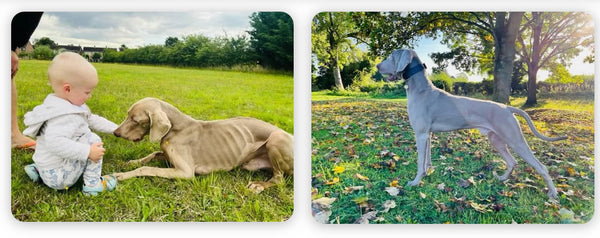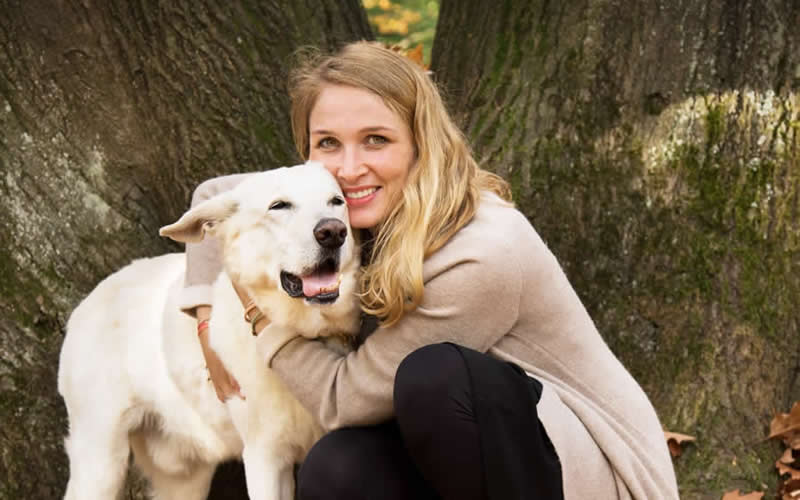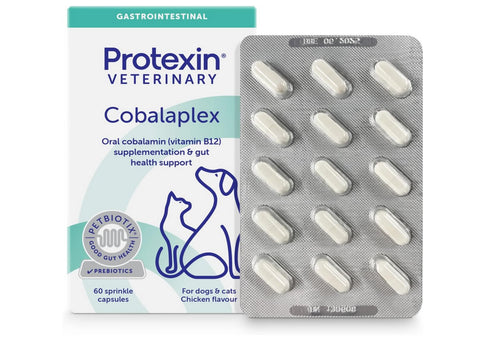Does your dog suffer from regular bouts of painful cramping followed by episodes of straining to produce mucusy and sometimes blood tinged diarrhoea, or large amounts of very soft diarrhoea with times of going off their food and weight loss?
Chronic intestinal disease in dogs (IBD) can be compared to IBS (inflammatory bowel syndrome) in humans where there are many theories about the disease but still many unknowns. I suffer as a vet from IBS and I know how debilitating it can be for our overall health, so when it happens to your dog, it is doubly as worrying, as none of us want to see our dogs in any form of pain.
What is fairly clear is that food intolerances and allergies with a compromised immune system and combined with an imbalanced microbiome are at the heart of the cause.
In my personal experience with the large number of dogs who I have helped as a vet transition to a gentle and easily digested truly novel plant-based protein diet, they do seem to all have many similarities -
 Your dog may have suffered from a bout of vomitting and diarrhoea in the past and your vet recommended a bland diet of chicken and rice, maybe even more than once.
Your dog may have suffered from a bout of vomitting and diarrhoea in the past and your vet recommended a bland diet of chicken and rice, maybe even more than once.
This results in your dog developing an intolerance to chicken and any similar avian food such as turkey, egg or duck as they are targetted with the same protein everytime they experience an acute attack of inflammation at such a vulnerable time. The lining of the intestine is invaded by inflammatory cells and an allergic-type response occurs within the intestinal tract. This inflammation interferes with your dog’s ability to digest and absorb nutrients.
 Your dog may have been treated in the past for an infection of Giardia or Campylobacter as a puppy and been given a course of Metronidazole that damages their fragile gut microbiome and again unbalances their immunity.
Your dog may have been treated in the past for an infection of Giardia or Campylobacter as a puppy and been given a course of Metronidazole that damages their fragile gut microbiome and again unbalances their immunity.
 Your dog has had a course of antibiotics or prednisolone for an infection or skin condition. This too has a resulting and long lasting effect on the good gut bacteria which compromises your dog's immune system and makes them intolerant and sensitive to high levels of proteins in the food, and in particular animal proteins.
Your dog has had a course of antibiotics or prednisolone for an infection or skin condition. This too has a resulting and long lasting effect on the good gut bacteria which compromises your dog's immune system and makes them intolerant and sensitive to high levels of proteins in the food, and in particular animal proteins.
All of the above can seriously compromise your dog's immunity as 70% of their immunity (and our immunity) is governed by our good gut bacteria. This leads to the intolerances to animal proteins and inflammation which results in painful cramps, inappetance and weight loss.
Please read about Duke the Weimeraner's experience below -
 “Our 3 year old Weimaraner Duke had been having chronic digestive issues for a couple of years, with things getting particularly bad when he turned 2. He had constant diarrhoea and quickly started to lose weight.
“Our 3 year old Weimaraner Duke had been having chronic digestive issues for a couple of years, with things getting particularly bad when he turned 2. He had constant diarrhoea and quickly started to lose weight.He went from weighing almost 30kg to 21kg. He was painfully thin and you could see almost every bone in his body. We tried everything. We were desperate to get answers. After many diet changes and countless visits to the vets urging them to investigate further, he was referred to a specialist and underwent tests which confirmed he had chronic IBD.”
“We tried 9 different brands of dog food in total (he continued to lose weight and have chronic diarrhoea on all of these). These included raw diets, hydrolysed diets, novel diets, insect protein diets etc, all recommended by a well known specialist vet after being referred to them by our local vet.
For example, Purina HA was recommended by the specialist as we were told it had no allergens yet we later realised it contained soya which is a common allergen in dogs with IBD! Not knowing where or who else to turn to, we scoured the internet in the hope of a miracle and we finally came across your website – and let me tell you what a revelation that was.
We were so impressed by the level of information about IBD, the possible causes and detailed information about how Solo Vegetal can help dogs like Duke. It felt like we were finally being seen/heard and for the first time, we felt like there might actually be a light at the end of the tunnel.
We booked an online consultation with Arielle to run through his background before we committed to switching diets once again and she made us feel like we could get Duke healthy again.
Arielle’s detailed explanation and reassurance gave us the confidence we had lost in everyone else. She explained things to us about the disease that no other vet had told us before and it was abundantly clear she truly understood the mechanics of IBD.
We proceeded to place our first order of Solo Vegetal on 28/07 and we haven’t looked back since. Without wanting to sound dramatic, Solo Vegetal and Give A Dog A Bean has literally saved and brought our boy back. Had we not found you when we did (we saw many vets including specialists and not one suggested a vegan diet so we didn’t even know this was an option for dogs) I dread to think where we’d be now!”
Read more about Duke here
Clinical signs of IBD and how it’s diagnosed?
IBD can involve any part of the digestive gastrointestinal tract, but most commonly affects the stomach and/or the intestines.
If the stomach is involved, your dog will experience chronic vomiting. If the intestines are involved, chronic diarrhoea will occur.
Besides x-rays and tissue biopsies your vet may also analyse the following:
- faecal tests – these tests look for infectious organisms such as Giardia
- measurement of the level of vitamin B12 (cobalamin) in the blood – this can indicate whether there is decreased ability to absorb nutrients and a need for supplementation (we stock vegan vitamin B12 cobalamin here)
- measurement of folate in the blood – this will show whether there is an imbalance in the normal bacterial populations in the gastrointestinal tract.
Can IBD be managed with a plant-based diet?
YES! The best diet for a dog with IBD would be a hypoallergenic, novel protein plant-based, diet that DOES NOT contain ANY of the following primary allergens for dogs:
BEEF, dairy, wheat, lamb, egg, chicken, soya, pork, corn, rabbit and fish – in that order.

The best ingredients for dogs with IBD are sweet potato (no skin), quinoa, oats. If a dog has severe diarrhoea and sickness, it is best to feed a soothing vegetable broth made from cooked celery, carrots, green beans and parsley with a bit of added salt. (See a soothing post-operative or post illness vegetable broth recipe here).
For owners choosing to homecook for their dog, supplementation of B12 (cobalamin) is important and can be found in our JUST BE KIND Supplement as well as pre and probiotics.
A natural anti-inflammatory that we highly advise you add to your dog’s diet when suffering from IBD is pure Omega 3 Daily.
See some real life case studies below and hear about real cases:
RUFUS THE LABRADOR HAS HIS IBD SETTLED WITH GENTLE SOLO VEGETAL
MILLY HAS TO BE ON A VEGAN DIET FOR HER HEALTH

Why do we recommend Solo Vegetal for IBD?
Solo Vegetal is grain free, hypoallergenic and one of the most effective diets in helping dogs with IBD. It is also very palatable. Weimeraner Duke shown above transformed when fed Solo Vegetal dry food. We have so many case studies of dogs transforming when fed Solo Vegetal as it is grain free, soya free and animal protein free and very palatable. It contains human grade ingredeints such as einkorn wheat (used in people with coeliac disease), as well as buckwheat which is in fact a seed rather than a wheat.

“Olli has canine IBD and we were nearly at the end of the road then we found you.
Thank you for what you do, without the Solo Vegetal he wouldn’t be here. I’m vegan so had no qualms about trying plant based for him but I’d just gone with the standard vet advice about food at first. He is one of seven rescues and most of them eat it now.” - Cherry Olli's Mum
Why do we recommend Greta for IBD?
Greta dry food is grain free, hypoallergenic and one of the most effective diets in producing firm stools in your dog. The food uses red beetroot as its nutrient source, which gives the food a rich red colour and it is VERY palatable.

Brian the Border Terrier suffered from such severe cramping and pain with constant illness until he transitioned from a raw food to a plant-based diet – it was quite literally life-changing for him and he now loves Greta and Green Crunch!
Why do we recommend Green Crunch for IBD?
We import Green Crunch from Germany as the results that we have seen with dogs not being able to tolerate any other foods and then transitioning to Green Crunch dry biscuits with its pure soya free ingredients have really been lifechanging. All the pain disappears and they really begin to enjoy their food again.
It is one of our only dry foods made with no rice, and the founder of Green Crunch has this story to tell about her own dog Nelson -
Her words are used below translated from the VegDog.de site.

“Crossbreed Nelson who died at the good age of 15 years, was a vegan for 7 years as he suffered from an intolerance to animal protein. We had Nelson as an adult rescue and when we first had him, we made numerous trips to the vets.
The vets were baffled and we tried everything that the market had to offer – hypoallergenic dry and wet foods as well as the recommended full range of exotic meats such as kangaroo meat or ostrich meat with potatoes. Nothing seemed to help him. My vet was so supportive and gave me a comprehensive balanced homemade recipe to try on Nelson. After 4 weeks, he was symptom free and he remained so for 7 years on his vegan diet! He lived until he was 16 years old!
Together with a professional vet specialising in animal nutrition, we developed our first vegan, grain-free and 100% complete food for dogs. VEGDOG was born!”
We have met the lovely Tessa and we import Green Crunch in the UK for your dog!
What is an elimination diet?
This means feeding your pet a diet from your vet or carefully made at home that contains only a few ingredients that your pet has never been fed before or that are hydrolysed (where the proteins are broken down into very small pieces so that they can ‘hide’ from the immune system). These diets tend to be very processed which makes owners turn to raw meat diets as they tend to have no additives, but are packed full of bacterial toxins as all meat should be cooked!
The use of raw feeding or any meat is NOT recommended, as it is usually the meat/animal protein that dogs react to the most!

This elimination diet recommended by more vets is then fed as the only food or treat to go into your pet’s mouth for at least a 4 – 6 weeks. If your pet’s signs dramatically improve during the trial, then to confirm a food allergy, your pet then has to go back to the old diet again.
A sudden relapse proves an allergy to an ingredient in your pet’s previous diet. It is difficult for owners to maintain as their vet will tell them to only feed the prescription food and offer no alternatives for treats or homemade food.
The biggest positive with a plant-based diet, is that dogs cannot be maintained on a hydrolysed prescription diet indefinitely as they tend to be low in protein and highly processed (yes one even has the addition of pure sugar), but they CAN be maintained on a balanced vegan diet for the rest of their lives and have a very good quality of life as there are so many options and healthy treats available.
 “A balanced plant-based diet is a good choice for a truly novel protein diet when food trialling dogs with potential cutaneous adverse food reactions.
“A balanced plant-based diet is a good choice for a truly novel protein diet when food trialling dogs with potential cutaneous adverse food reactions.Royal Canin Anallergenic™ INGREDIENTS:
Corn starch, hydrolysed poultry by-products aggregate (chicken feathers!), coconut oil, vegetable oil, natural flavours, powdered cellulose, dried chicory root, sodium silico aluminate, potassium chloride, monocalcium phosphate, L-tyrosine, fructooligosaccharides, fish oil, choline chloride.Purina ® HA Hypoallergenic INGREDIENTS:
Corn starch, protein, minerals, coconut oil, sugar (!), rapeseed oil, cellulose, soya oil, fish oil
Hills Derm Complete INGREDIENTS:
Brewers’ rice, dried whole egg, digest (made of chicken intestine or fish), soybean oil, rice protein concentrate, flaxseed, minerals, dried beet pulp, fish oil, coconut oil, animal fat, dried tomato pomace, dried citrus pulp, spinach powder, vitamins, trace elements and beta-carotene.
Hills Prescription Diet Z/D
The ingredients as stated on their Hills official website, show many animal byproducts that sensitive dogs react to -
INGREDIENTS: Meat and animal derivatives, cereals, derivatives of vegetable origin, oils and fats, minerals. Carbohydrate source: Corn starch. Protein source: Chicken liver hydrolysate.
WHAT ARE THE INGREDIENTS IN OUR PLANT-BASED FOODS?
Solo Vegetal
Composition:
Micronised rice, potato and pea protein, white oats and hulled oats, einkorn wheat, buckwheat, spelt, vegetable oils and fats (including evening primrose oil and borage oil), potato flakes, dried beet pulp and chicory, isolated vegetable protein, hydrolysed vegetable proteins, wheatgerm, micronised dried carob flour, dry brewer’s yeast, minerals, flaxseed, dried carrots, tomatoes, apples, spinach and herbs, fructo-oligosaccharides, yeast hydrolysates.
Analytical Constituents:
Crude Protein 24.0%, Fat Content 11.25%, Crude Fibre 3.7%, Ash 5.2%
There are NO genetically modified ingredients and although the ingredients do mention wheat (known to be an allergen in dogs); buckwheat is in fact a seed and it contains many beneficial nutrients.
Einkorn wheat is chosen for its antioxidant properties as well as being loaded with the essential nutrients zinc, iron, potassium, riboflavin, and vitamins B6 and A. All very important for heart health. It also contains added Taurine, Methionine and a pure plant-based source of Vit D3.
(We highly recommend Solo Vegetal as it is very tasty and our own family dog Ruff LOVES it!)

Green Crunch from VegDog
We promote and highly recommend Vegdog’s Green Crunch as it is made up of lentils, sweet potatoes and peas that provide the essential healthy proteins. Added algae oil contains the necessary Omega-3 and-6 fatty acids that contribute to a soft coat and healthy skin; and the addition of an adapted mineral powder, provides the vital nutrients for a healthy heart, such as Vitamin B12, D3, Taurine and L-carnitine.
Vitamin-packed fruit and vegetables such as pumpkin, carrots and blueberries, provide large amounts of natural Vitamins A, C and E while also being high in fibre to support a balanced gut microbiome for immune-friendly qualities.
Blueberries are loaded with antioxidants and all contribute to a very palatable and fully hypoallergenic balanced food for your lucky plant-based dog.
INGREDIENTS 35% sweet potato, 18% peas, 15% lentils, minerals, rapeseed oil, sunflower oil, linseed, carob, brewer's yeast, carrot, 0.1% blueberries, pumpkin, 0.1% algae
ANALYSIS Crude protein 23%, crude fat 7.5%, crude fibre 3.3%, crude ash 6.3%, moisture 8%, calcium 0.8%, phosphorus 0.4%, Ca:P ratio 2.0:1 Purine content: 40mg/100g
What else do we advise for dogs with IBD?
So often, dogs with with IBD suffer from such chronic inflammation that they lack the ability to manufacture and absorb enough Vit B from their intestines. This will need to be added to their diet in the form of a supplement. Most vets will recommend and dispense Protexin Cobalaplex for dogs with IBD needing Vit B.....BUT PLEASE BE AWARE THAT IT CONTAINS ANIMAL PROTEINS IN THE GELATINE that so many dogs react to!

Yes, Protexin Cobalaplex comes in gelatine capsules that contain the same DNA as beef and can result in painful inflammation recurring in your sensitive dog if fed whole and not emptied onto their food. Some vets are unaware of this and do not advice this recommendation to sprinkle the contents only.
The best Vitamin B complex would be Together Health Multi Vitamin to purchase in our Just Be Kind Shop here or click on link below.
Please note that Purina make a probiotic called Fortiflora that also contains E. Faecium....but it is full of animal proteins too that many dogs react to!
We rather advise using Nutraflora capsules for extra probiotics that are full of B Vitamins and NO animal derivatives. See link in the image below, we do not sell it. Nutraflora is very expensive, and you could also feed your dog gut health coconut yoghurt (from Sainsbury or Tesco's), or tempeh which is fermented soya beans also rich in natural probiotics and dogs seem to love the taste of tempeh which we highly recommend!
WHAT ABOUT TREATS FOR DOGS WITH IBD?
We are SO proud to also sell and produce natural dog treats that enhance and soothe your dog with IBD (and they are delicious!) - Marshmallow Bites grain free hand baked treats contain Sweet Potato Flour, Chickpea Flour, Peanut Butter 16%, Potato Flour, Dried Carrot 4%, Dried Apple 3%, Slippery Elm 1%, Marshmallow Root 2%, Chicory Root Extract 1%, Dried Carob 0.5%, Dried Cranberry 0.5%, Postbiotic (Tyndallised Lactobacillus Helvictus HA-122) 0.1%













